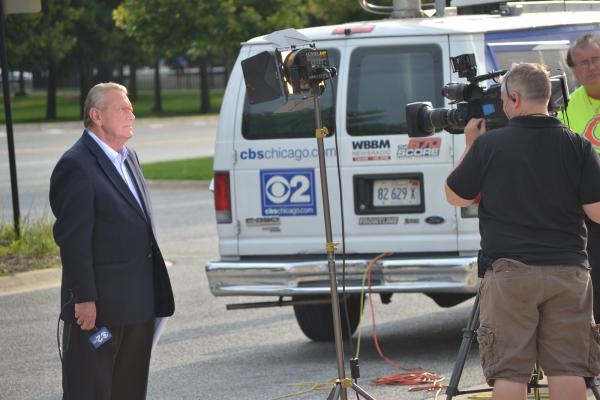The American public's trust in US media has cratered in recent years. Just “7% of U.S. adults say they have 'a great deal' and 29% 'a fair amount' of trust and confidence in newspapers, television and radio news reporting,” Gallup reported on October 7. This isn't a record low, but it's awfully close. The media's lowly reputation among Americans is just four points above the record low in 2016, 32 percent. The “bottom line,” according to Gallup?
Just as Americans' trust in the three branches of government is faltering, so too is their confidence in the fourth estate -- the media.
Most commentary about the poll results has focused on the obvious partisan split in which Americans trust the media. Although Democrats' trust has declined by roughly five points from last year, America's increasing skepticism of reporters has been driven by Republicans, who, according to The Hill, believe “that most of the news comes from liberal news organizations.”
There's no reason to doubt that most media outlets have clear biases, but this is the sort of banal observation that you'd find in books on Amazon's list of Politics & Government bestsellers. The more interesting detail from the Gallup survey is that Independents, Americans with no political party affiliation, are almost as distrustful of the corporate media as Republicans. Just 31 percent of Independents have a “great deal” or “fair amount” of trust in popular news outlets.
The real takeaway, then, isn't that the media have biases; everybody has those. The real issue is that journalists often reach conclusions that don't follow from the facts they report, or they simply don't report newsworthy stories. This is readily apparent to most Americans—whatever their political leanings.
There are plenty of pandemic-related examples that illustrate why the media, both left and right, have such a bad reputation. Let's look at two recent stories to get a better sense of what's wrong with so much of the COVID reporting we see.
Reuters on vaccine mandates
“Vaccination rates against COVID-19 in the United States have risen by more than 20 percentage points after multiple institutions adopted vaccine requirements,” Reuters reported on October 13, “while case numbers and deaths from the virus are down, Biden administration officials said on Wednesday.”
This is a textbook example of the issue outlined above. All the numbers Reuters reported are accurate, but the story's conclusion doesn't follow. For one thing, CDC data show that the US vaccination rate dropped in the weeks after President Biden announced his mandate on September 9, climbed slightly in early October (probably as many elderly Americans sought booster doses) then fell again. The trend is even more stark when we look just at individuals receiving their first dose.
For another, people decide to get vaccinated (or take other preventative measures) for all sorts of reasons, many of which have nothing to do with the stringency of public policy. There's no reason to think that mandates necessarily boost vaccine uptake; indeed, there are good reasons to believe they can have the opposite effect, and we are watching this scenario play out in cities across the US and around the world.
Citing White House COVID-19 response coordinator Jeff Zients, Reuters also reported that “77% of eligible Americans have received at least one shot of a vaccine.” That's correct, but what does it have to do with mandatory shots? Almost 65 percent of American adults were fully vaccinated when President Biden announced the mandate last month, and deaths were already plummeting from their peak in January 2021—right around the time FDA approved Pfizer's and Moderna's shots.
Those are very encouraging statistics, so why weren't they the focal point of a story about vaccine success? Moreover, why were the media panicking about low vaccination rates earlier this year when uptake was actually increasing? Oddly, reporters are now defending the efficacy of mandates as immunization rates decline. They have it exactly backward.
CDC on school masking
The developments journalists choose not to report may also help explain the public's dwindling trust in US media. In early September, Fox News obtained emails revealing that the CDC had adjusted its guidance on masking in schools in response to pressure from the National Education Association, one of the two largest teachers unions in the country.
The National Review, The Federalist, and a few other conservative outlets picked up the story, but none of the major networks or papers covered it, leaving their audiences in the dark. CNN ran a report several weeks later about the CDC's justification for the new masking guidelines, though it made no mention of the NEA controversy, nor any earlier research that might raise questions about mandatory masking in schools.
There's nothing wrong with teachers unions influencing policy in public schools. That said, why did an agency like the CDC, staffed by some of the world's best infectious disease experts, cater to an organization with no scientific expertise? Why didn't their discussions take place in a public forum, where the public could see and respond to the proposed guidance before it was implemented?
Those are the sorts of questions journalists should have asked the NEA and CDC. They have no problem inquiring when they suspect that chemical companies pressure the EPA for industry-friendly regulations, eagerly rifling through the emails of corporate executives to find out what's going on. Why was the story about the CDC's guidance any different?
Media outlets that consistently practiced that kind of investigative journalism, whatever the subject of their investigation, would have the public's trust. But they don't; their coverage is routinely misleading or incomplete, and this is the result.




